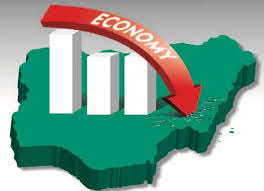In the last 14 months, Nigeria’s economy has been devastated by an odd combination of low revenue, exchange rate gyration, spiraling inflation and alarmingly high lending rates.
The exchange rate of the naira fluctuated from N460 to N1,530 to the dollar within the period. Headline inflation stands menacingly at 34.1 per cent as food inflation surged to 40.8 percent.
In a desperate bid to tame the depletion of the purchasing power of the naira fanned by spiraling inflation, the Central Bank of Nigeria (CBN) pushed the monetary policy rate (MPR), the nation’s benchmark lending rate, to a record 26.25 per cent.
As manufacturers and service providers groan under the excruciating pains of high lending rates, an odd combination of high energy cost obdurate insecurity and primitive farming method escalated the cost of living in the land.
Nigeria’s 140 million people living below poverty line are the worst affected. Fortunately, there are strong indications that bright light of imminent economic recovery has been spotted at the end of the tunnel.
Critical stakeholders in the economy came together recently at the National Assembly to assure persevering Nigerians that steps taken by the President Bola Ahmed Tinubu administration to reverse the hardship were yielding fruits and that the economy was on its recovery path. They assured that the hardship would soon end.
Mele Kyari, group managing director of the Nigerian National Petroleum Company Limited (NNPCL), the nation’s oil industry regulator, was the first to speak.
He assured that President Tinubu’s reforms in the critical oil industry was improving oil production and that Nigeria would soon be producing 2 million barrels of crude oil per day.
Kyari was apparently referring to Tinubu’s marching order to General Christopher Musa, the chief of defense staff (CDS), to end crude oil theft and ensure that every drop of oil from the nation’s oil well is accounted for.
High velocity criminals steal a minimum of 450,000 barrels of crude oil daily from Nigeria’s oil fields. That and other production obstacles have combined to reduce Nigeria’s daily crude oil production to a scant 1.27 million barrels per day.
At the current oil price range of $84 per barrel, what is stolen in the fields amount to something close to $40 million per day. If that is added to the dwindling supply of forex in the foreign exchange market, the naira would be trading at N800 to the dollar.
Kyari also assured that by the end of 2024, Nigeria would switch from complete dependence on refined petroleum products imports to major exporter of the products that was flushing a minimum of $20 billion down the drain annually.
“We have already seen growth in our oil and gas production because of certain actions that Mr. President took, and also the very fact that we have also declared war on production activities and this is yielding the required results…We will soon meet the target of 2 million barrels of oil production per day.
“We are very optimistic that by December this year, this country will be a net exporter of refined petroleum products. That means a combination of production coming from us and also from Dangote Refinery and other smaller producing companies that we know are in line to do this”, said Kyari.
There are strong indications that after missing the deadline on several occasions, the Port Harcourt Refinery would come on stream by the middle of August.
That would be followed in a few months by Warri Refinery, while Kaduna Refinery is expected to churn out refined petroleum products by the end of 2024.
Dangote Refinery commenced production in January and is now working feverishly to meet its installed capacity of 650,000 barrels per day.
Aliko Dangote, president of the Dangote Conglomerate, said recently that his refinery and the petrochemical plant beside it would be generating $30 billion annually from products exports.
That is good news for the crippling forex supply deficit in Nigeria’s foreign exchange market. If Dangote alone rakes in $30 billion in a year and Nigeria’s four refineries chip in something from exports in addition to that, the naira could be trading at N700 to the dollar within months. That would drastically stem imported inflation.
Perhaps the most soothing news from the bright light at the end of the nation’s economic tunnel is that self-sufficiency in refined petroleum products would also ease the surging energy cost and exert downward pressure on inflation.
Even the CBN has assured that the measures it has taken would soon force down inflation.
Blueprint is excited by the imminent economic relief. We urge the federal government to end the squabbles over crude oil supply to Dangote Refinery to enable it function effectively.
